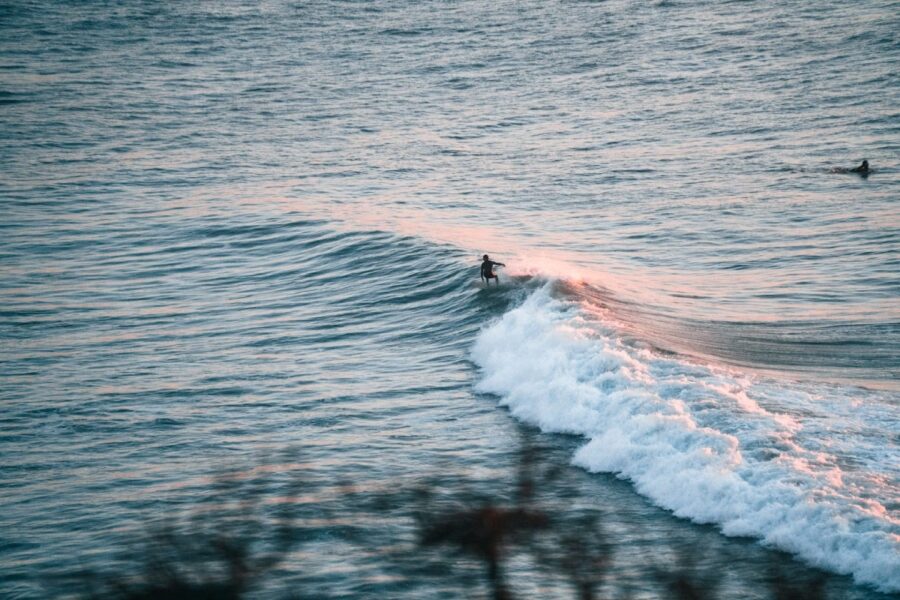
When it comes to surf travel in Europe, a few countries might make the shortlist—but Portugal often takes the crown. With consistent swell, a ruggedly beautiful coastline, and surf spots for every level of surfer, it’s easy to see why. Add in mouthwatering food, world-class wine, warm hospitality, and postcard-worthy scenery, and you’ve got a destination that delivers both in and out of the water.
Portugal strikes a unique balance—modern and efficient, yet steeped in history and timeless charm. Whether you’re wandering cobblestone streets in a centuries-old town or catching golden hour over cliffside beaches, this is a place that feeds your soul as much as your surf stoke. And the surf? From mellow beach breaks to thundering slabs, Portugal’s coastline is a playground for surfers of every stripe.
In this guide, we’ll cover everything you need to plan a seamless surf trip to Portugal—from region-by-region breakdowns of where to surf and when to go, to top surf breaks, where to stay, transportation tips, travel essentials, and what to do when you’re not chasing waves. Whether it’s your first time surfing in Portugal or you’re coming back for more, this guide is designed to help you make the most of it. Let’s dive in.
Want to Have the Best Surf Trip to Portugal?
We create unforgettable surf trips in Portugal, crafted with local know-how and surf expertise. Go custom with our Tailor-Made Surf Trips designed for your style and crew, or jump right in with one of our expertly curated Ready-to-Book Portugal Surf Trips.
Surfing Portugal
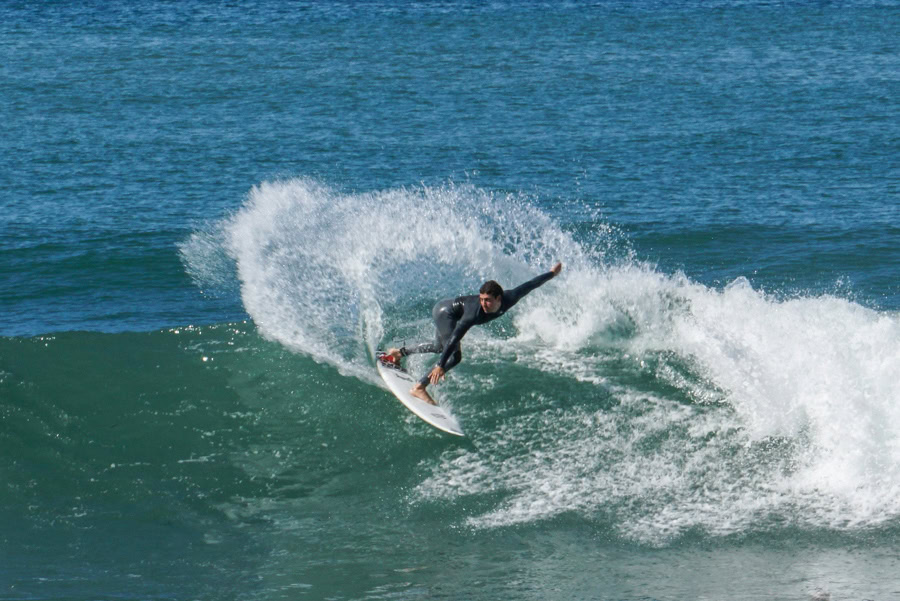
The main surf centers of Peniche, Nazaré, Cascais, and Ericeira are home to some of the best waves on the European continent, but they are only the tip of the iceberg. For every wave you have heard of, there are dozens more littering the coast, which faces straight into the Atlantic and picks up tons of swell.
Portugal also picks up a lot of weather, but with so many nooks, crannies, and bits of coastline facing different directions, it is almost always possible to score good waves. In fact, a few years back, the Portuguese tourism bureau famously offered a “guaranteed score” deal to visiting surfers, promising to finance a return trip to the country for anyone who got skunked.
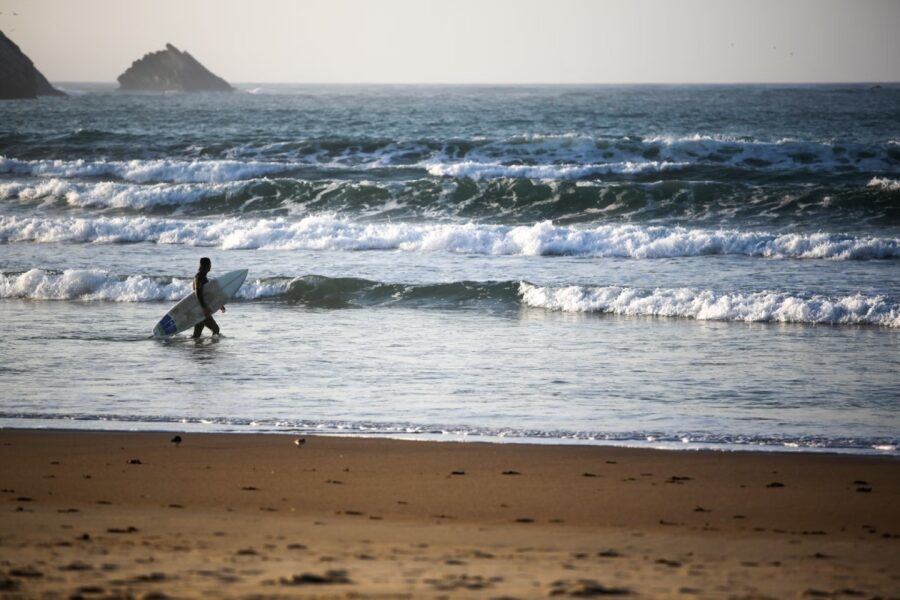
Any country this rich in waves will typically have a large surf scene, and Portugal is no exception. Thousands of traveling surfers and backpackers looking to learn flock to the surf schools in the regional centers, where the only thing as consistent as the waves is the nightlife.
The country hosts multiple qualifying series events, a world tour event at Supertubos, and a Big Wave Tour event at Nazaré, which is not only the biggest wave in the world but also one of the biggest spectacles in Portugal. Tens of thousands of people line the cliff whenever Nazaré breaks (and even on days when it’s barely capping)—and most of those people don’t even surf!
Nazaré is a bona fide tourist attraction in a country that is already known as having some of the most die-hard surf fans on the planet. Indeed, the Portuguese love surfing more than just about anyone, which makes a visit for the average surfer even better.
Surf Seasons and Swell Info
Summer (June through September) tends to have the best weather and is an ideal time for beginner and early intermediate surfers looking for smaller waves. For more advanced intermediates and advanced surfers, the summer isn’t ideal if you’re looking for larger and more challenging waves. Winter (December through March), has non-stop waves, but the wind and weather can be an issue. As with most places in the northern hemisphere, autumn (September through November) is prime season, with good weather, predominantly favorable winds, and relatively consistent west swells out of the Atlantic.
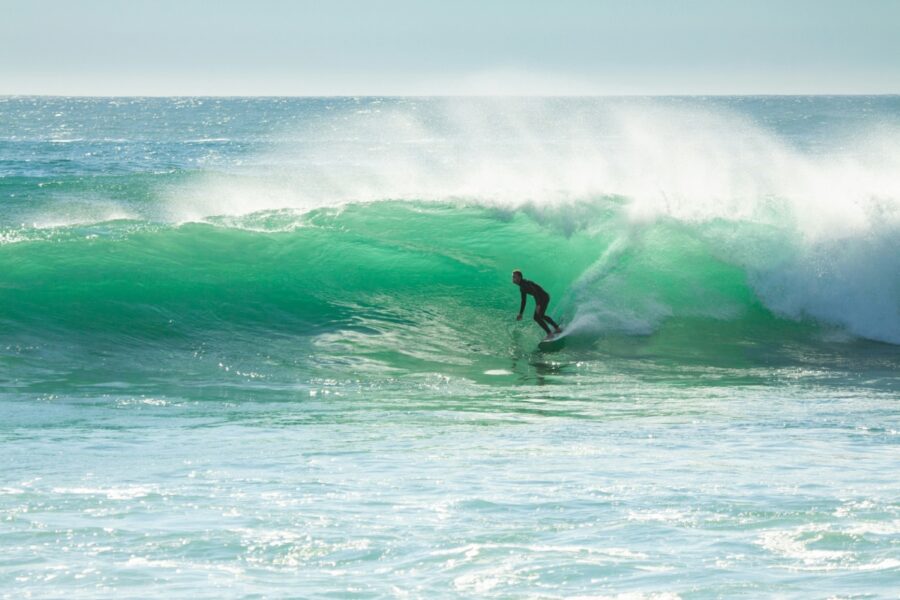
Types of Surf Breaks
Portugal has just about every type of surf spot available, including slabs, point breaks, soft beach breaks, hollow sandbars, and the world’s biggest XXL spot.
Level of Difficulty
Depending on where you go, you could surf a mellow beginner wave, the world’s heaviest big wave, or anything in between.
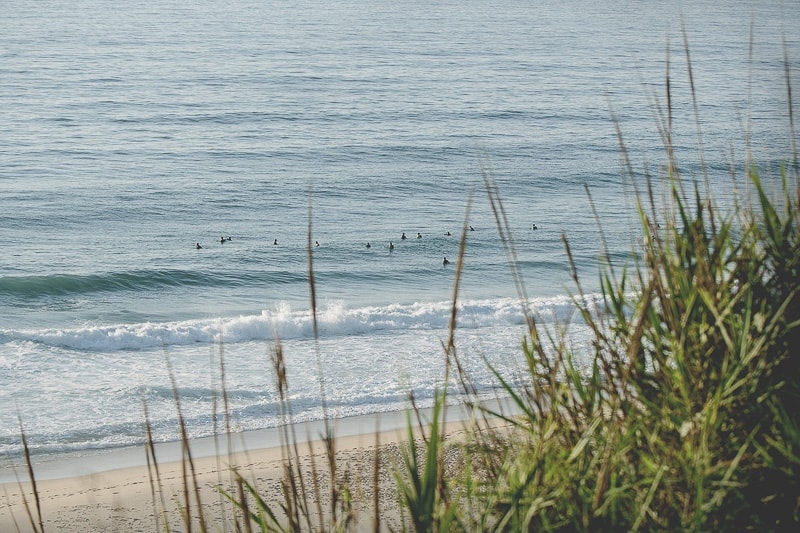
Crowds
While the major surf centers like Peniche and Ericeira can get incredibly crowded, the reality is that 90 percent of Portugal’s surf has never been featured in the media. In other words, if you are willing to get away from the big-name zones and do some searching, you can easily surf world-class waves alone or with a few friendly locals. Make friends while in the country, and you just might find yourself being led to secret points and beach breaks that are even better than the spots you’ve seen in the magazines.
Water Temperature
The water in Portugal ranges greatly by season, and also somewhat by location (with northern beaches being slightly colder on average). Peniche is centrally located and sees water temps up into the low 20s Celsius (68-70 Fahrenheit) during summer, and down around 15 Celsius (59 Fahrenheit) in winter.
Getting to the Surf
Portugal has great infrastructure, and virtually all surf spots are accessible by car. Rental vehicles are readily available, as is online information about the marquee spots in the country.
Where to Surf in Portugal
Ericeira
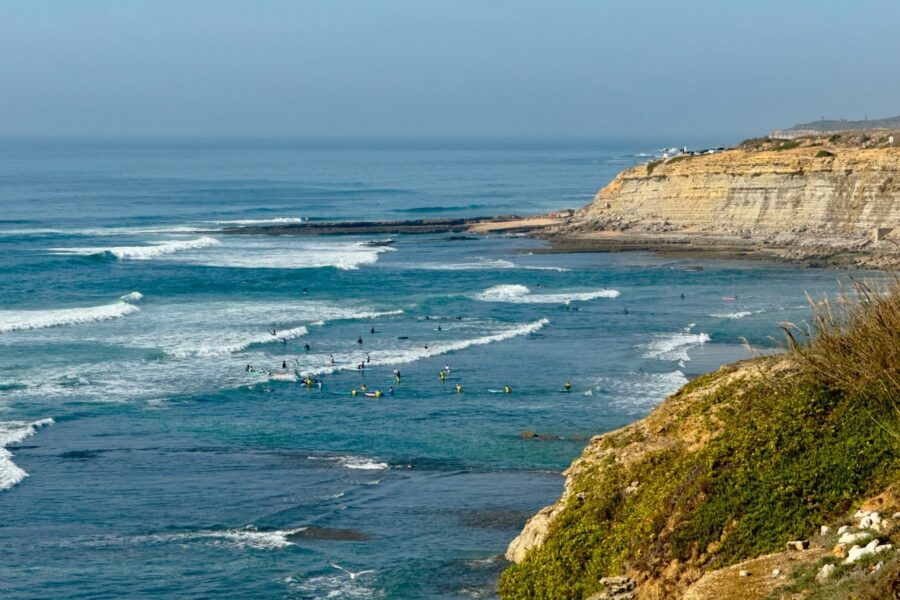
Largely considered to be Portugal’s surf capital, Ericeira has a huge variety of waves ranging from beginner spots to expert only. It is one of the few regions to be named a World Surf Reserve, and the first in Europe. With beach breaks, slabs, and points such as the world-class Coxos (one of the best right-handers in Europe), Ericeira should be a bucket-list destination for every surfer from the European continent.
The Algarve
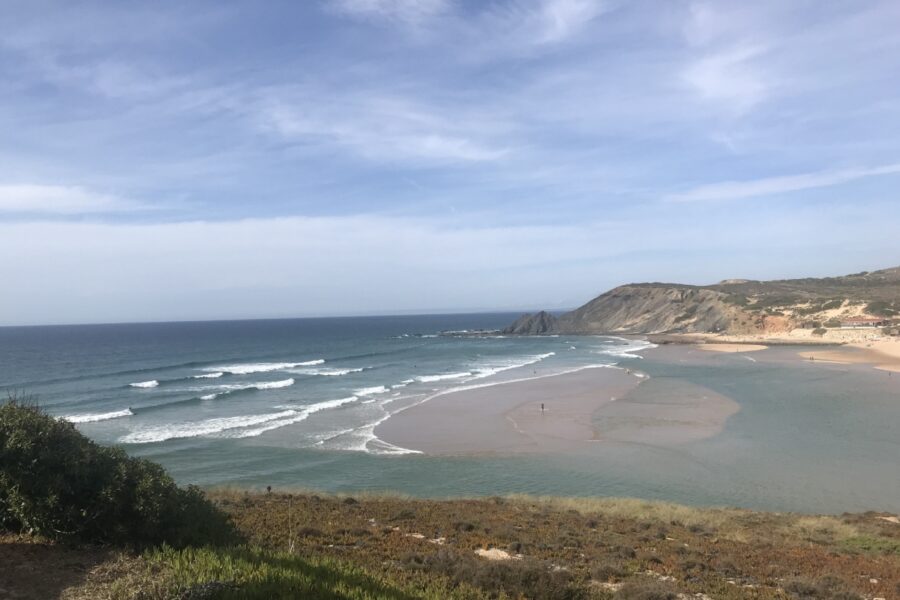
The Algarve’s position on the corner of the Iberian Peninsula blesses it with the widest swell window in Portugal and frequent offshores on the south coast. There’s a wide range of reef and beach breaks, and the vast unspoiled coast gives you the potential for uncrowded waves. Waves can be found year round in the region, although the summer can bring some flat spells.
While May through July is typically the least favorable time for more advanced surfers, if you’re a beginner to intermediate surfer, this can be a great time to visit, as the waves are smaller and the weather and water are warmest. The peak season for advanced surfers is from October through December.
Peniche
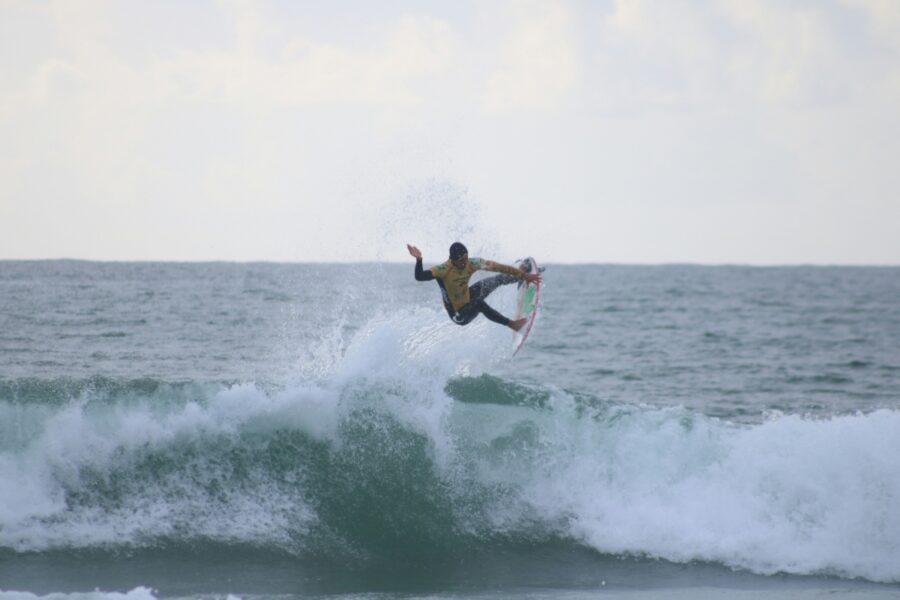
Home to numerous surf schools, a world tour event, and dozens of quality waves (including the famed Supertubos), Peniche is a quaint little town that has become one of the biggest surf scenes in Europe. Whether you’re looking to surf drained-out sand-bottom barrels or stand up for your first time in rolling beginner waves, this is the place to do it.
Cascais
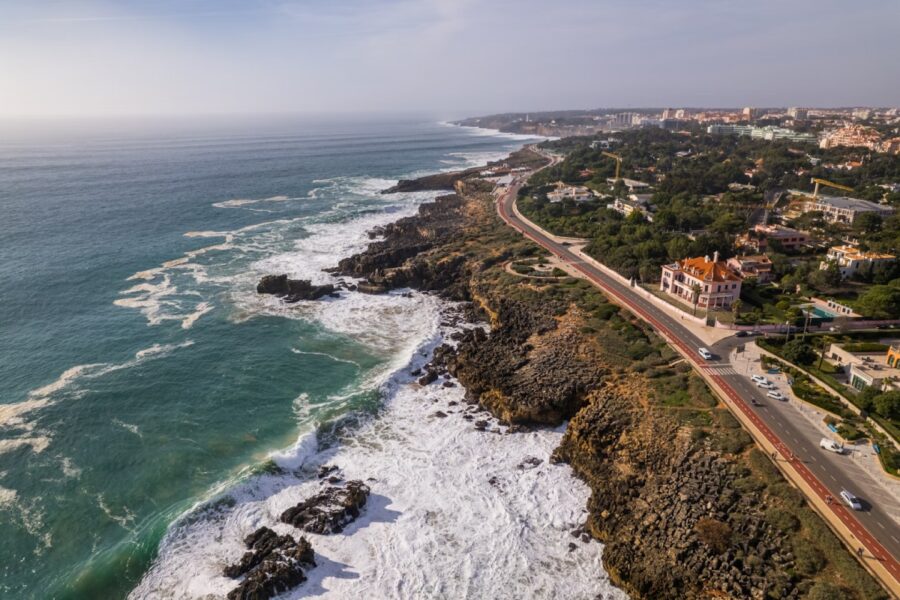
Located a stone’s throw from the capital city of Lisbon, Cascais is a resort town with a laid-back vibe, beautiful beaches, and a bunch of super fun waves. There was a women’s world tour event there for much of the past decade, and numerous surf schools, shops, and camps have sprung up as the Portuguese surf industry has grown. For a quaint European surf experience with a coastal resort feel, Cascais fits the bill.
Nazaré
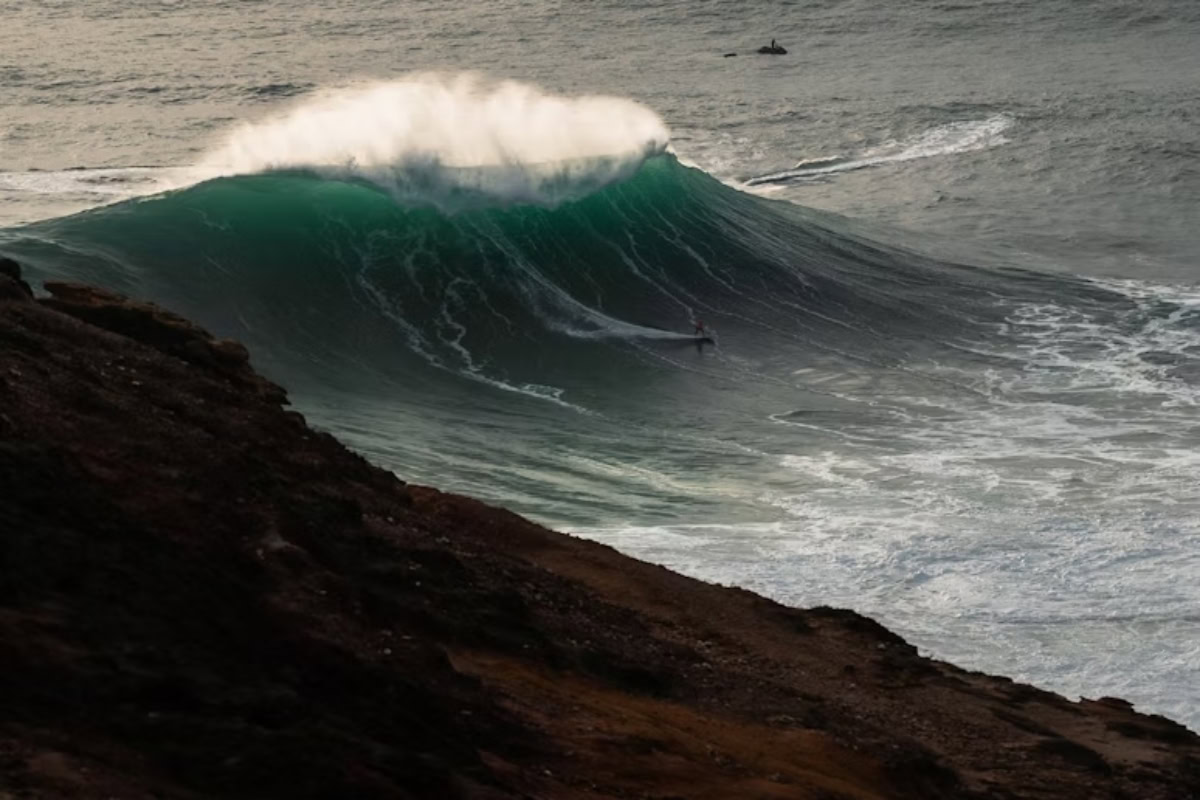
Until 2010, Nazaré was little more than a blip on the pro bodyboard tour—a heavy beach break with astronomical potential that the surf world had somehow missed. Then Hawaiian big wave surfer Garret MacNamara was invited to Nazaré by Dino Casimiro to check out Praia de Norte, a wave that the local bodyboarder thought might be the biggest in the world. A decade later, Nazaré had become ground zero for XXL surfing.
The gargantuan, wedging beach break at Praia de Norte breaks records every year for the biggest waves ever towed, hosts a Big Wave Tour event, and is home to the most surf-friendly local government in existence. When the mayor shows up for every swell, throws shakas to everyone he meets, and counts most of the world’s best big wave surfers as personal friends, you know you’ve found a town worth visiting.
The Azores & Madeira
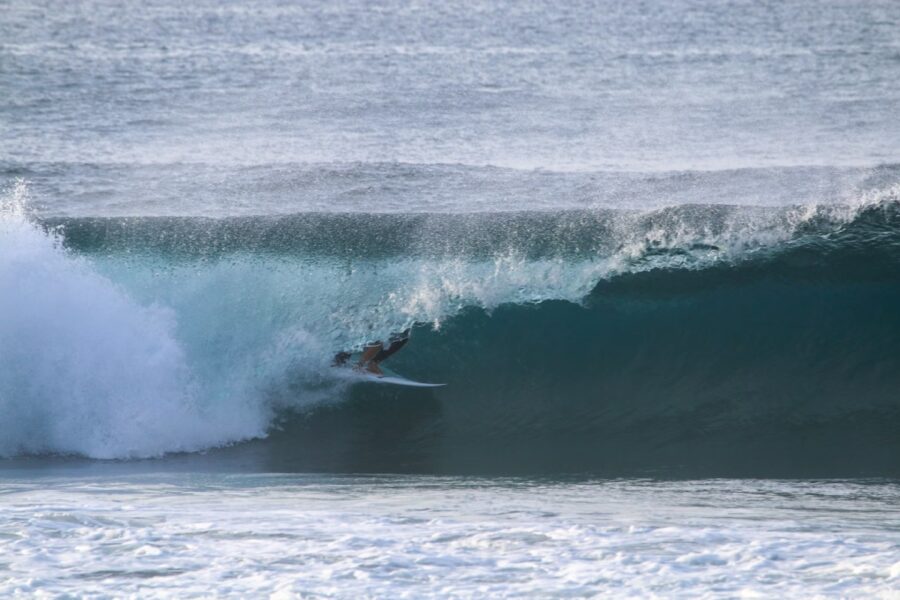
Many people forget that Portugal is more than just a country on the European continent. It also has a number of islands, including Madeira and the Azore chain. These volcanic islands have a variety of waves as well, including numerous points that break along picturesque cliffs.
Top Surf Breaks in Portugal
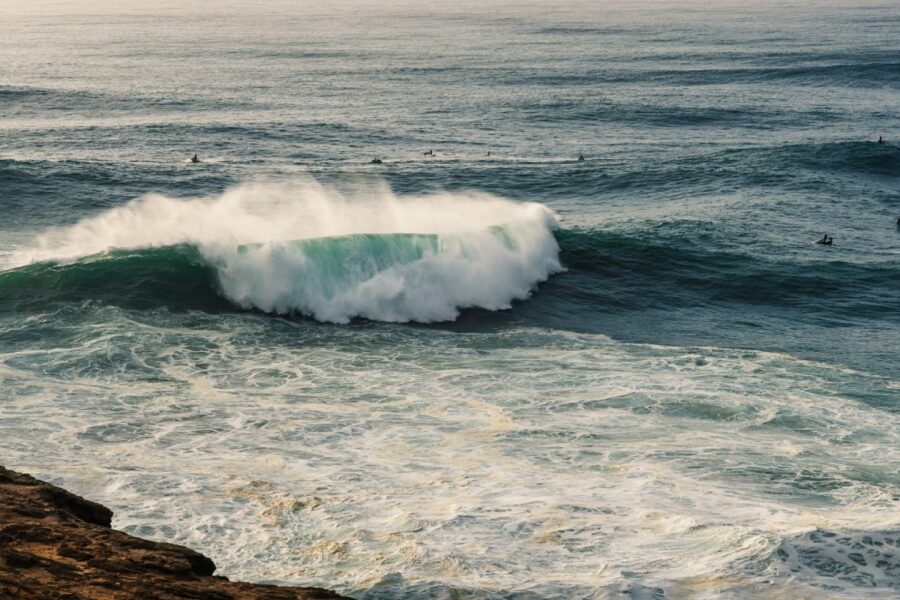
Supertubos
One of the best beach breaks in Europe (if not the world), Supertubos in Peniche is a series of super hollow, dredging sandbars, and one of the most famous waves in Portugal. The world tour runs an event here each year. Getting barreled here is as easy as driving in, parking, paddling out, and being able to ace a critical drop amongst an uber-competitive crowd.
Nazaré
The world’s biggest, baddest wave, Praia de Norte (often referred to simply as Nazaré) is a heavy, hollow beach break/shore break when small and a gargantuan sand-bottomed wedge when big—which happens quite frequently during winter. Breaking in front of an iconic farol (lighthouse) on a cliff between Praia de Norte and Praia de Sur (North Beach and South Beach), right in the middle of the town of Nazaré, this has to be the best big wave spectating arena in the world. Tow surfing tends to dominate when Nazaré is huge and unruly, but the past few years have seen paddle sessions in huge swells as well. An annual Big Wave Tour tow event is held each winter.
Coxos
This hollow, heavy point break in Ericeira is considered by many to be one of the best right-handers in Europe. As such, it is notoriously crowded when it fires, and the vibe in the water can be a bit surly at times.
Cave
A hairball reef slab that should only be surfed by pros and expert hellmen, Cave is a super shallow, slurped-out, right-hand slab just south of Coxos in Ericeira that often has multiple lips and can suck dry.
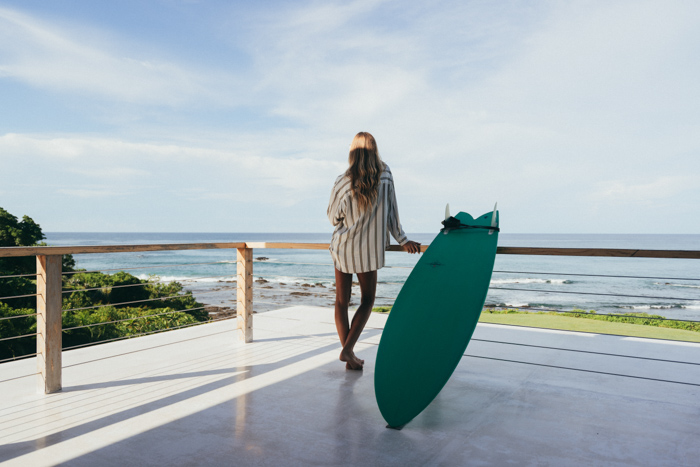
Epic surf trips made easy.
Explore luxury done-for-you surf vacations with Lush Palm Private Retreats.
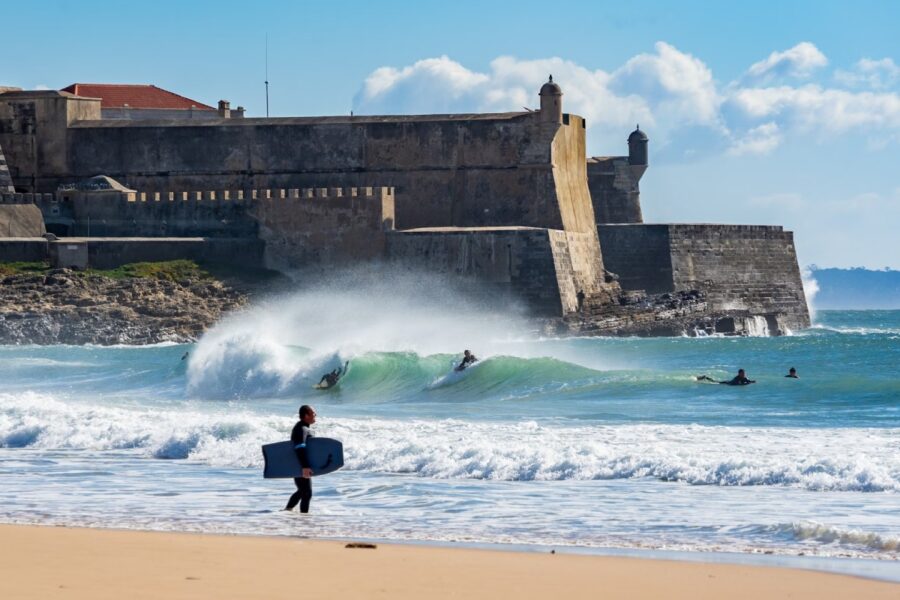
Carcavelos
A series of sandbars located on the border between Lisbon and Cascais, Carcavelos is arguably the birthplace of Portuguese surfing, and offers up both beginner sections and barreling peaks for experts.
Jardim do Mar
Formerly the crown jewel of Atlantic surfing, Jardim do Mar on Madeira was a world-class right-hand point break that pumped from head high up to triple overhead+. Unfortunately, the wave was damaged due to coastal development in the early 2000s. The wave is still surfable at certain tides, but is only a shadow of its former self.
Sagres
The epicenter of surfing in the Algarve region, Sagres has numerous surf spots on offer, all in a beautiful setting. This region caters to all levels of surfers, but requires a willingness to drive and explore.
Where to Stay

Portugal has a wide variety of accommodations, ranging from quaint and comfortable to luxury. Accommodations book up early in the peak season of summer (June – September) and are more readily accessible in the winter months (November – March), which works out great for surfers chasing winter swells. If you’re looking to travel in the peak summer months, we highly recommend booking as far in advance as possible for the best options and availability.
Portugal is home to many stunning boutique hotels and villas. From picturesque refurbished farmhouses to modern luxury getaways, there are plenty of amazing stays to choose from.
Below is just a sampling of the beautiful properties we have available for your surf vacation in Portugal. We hand-pick properties based on design, amenities, and proximity to surf breaks.
Want to experience the best of Portugal without the hassle of planning? We specialize in unforgettable Portugal surf trips, available in two ways:
- Tailor-Made Luxury Surf Trips are fully customized to your surf level, style, and travel preferences. Think: insider surf intel, expert local coaches, stunning villas, private chefs, surf photography, and more—all curated into a 5-star surf vacation just for you.
- Ready-to-Book Portugal Surf Trips are premium, ready-to-book experiences designed to give you the best surf trip—effortlessly. Whether you’re going solo, with your partner, a group of friends, or the whole family, this all-in-one package includes everything you need for a next-level surf getaway.
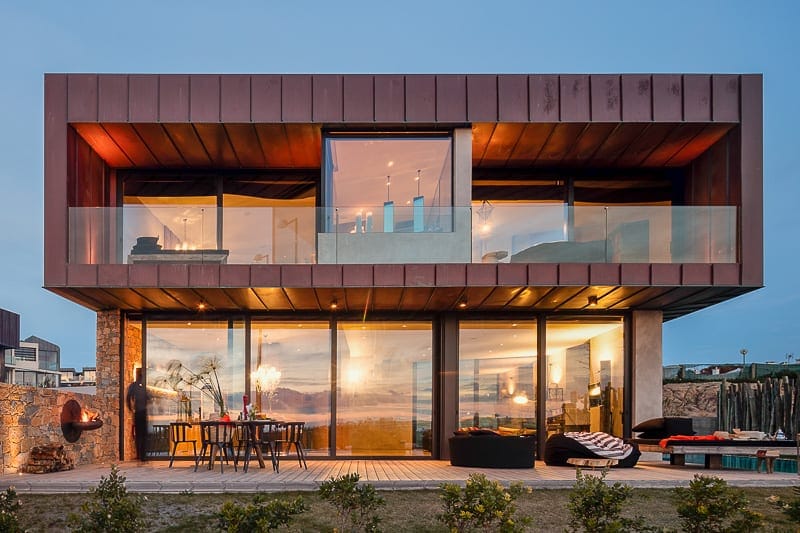





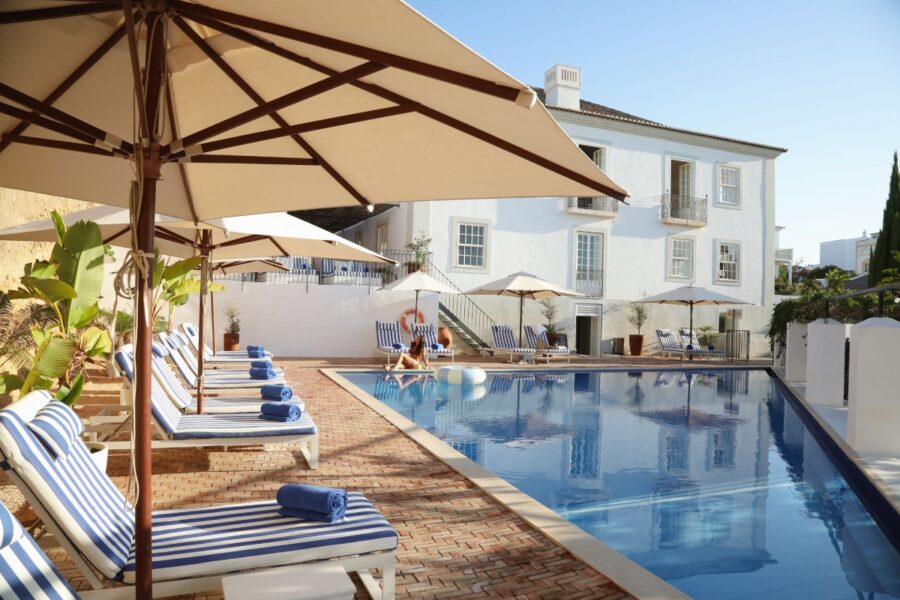
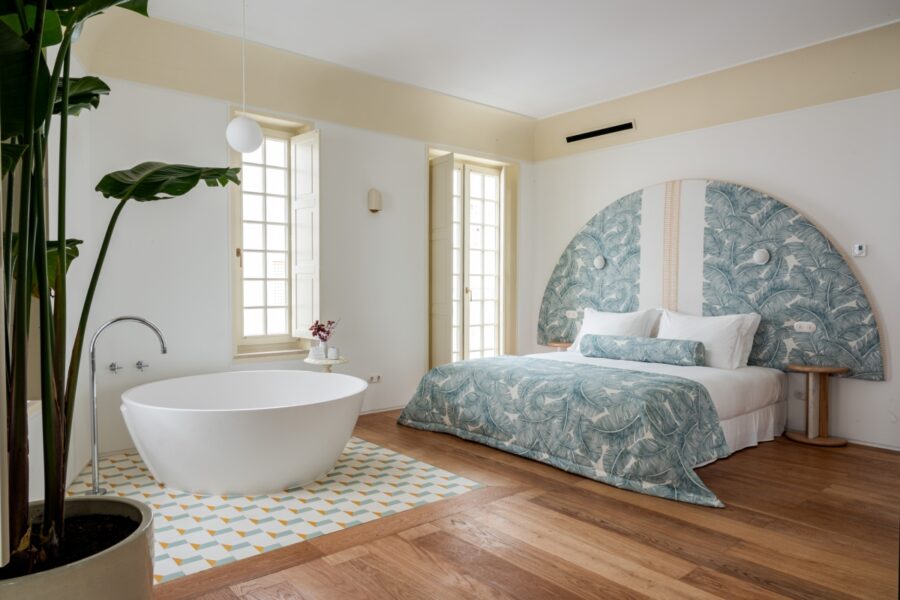
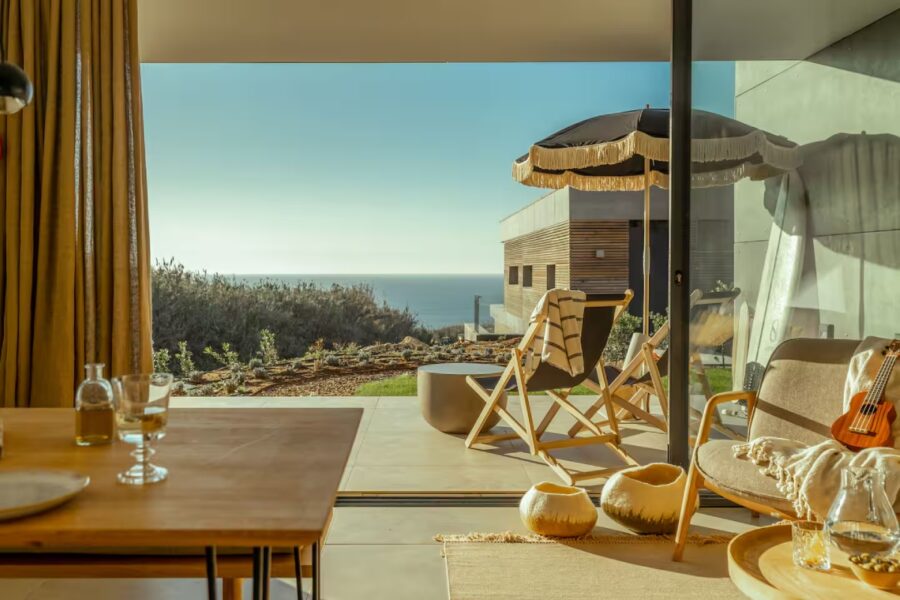
Want to Plan the Ultimate Surf Trip to Portugal?
We create unforgettable surf trips in Portugal, crafted with local know-how and surf expertise. Go custom with our Tailor-Made Surf Trips designed for your style and crew, or jump right in with one of our expertly curated Ready-to-Book Portugal Surf Trips.
Travel Basics

Seasons & Weather
Portugal enjoys the same general weather pattern as the rest of coastal Europe—warm, sunny summers, a picturesque autumn season with good wind and ideal weather conditions, and colder winters that can range from briskly sunny to downright stormy. Summer is usually pretty slow as far as surf goes, autumn enjoys the ideal combination of consistent swells and good conditions, and winter has non-stop swell—some of the most consistent in Europe. But because the storms generating these swells tend to track straight into the coast, the trick in winter is finding spots that are protected from the wind.
Currency
As with most of Western Europe, the local currency is the euro. Portugal is a relatively affordable European destination, but there is no shortage of luxury accommodation options and boutique attractions.
Staying Connected
There is Wi-Fi connectivity basically everywhere you go, as well as comprehensive mobile phone and data coverage. The major mobile providers in Portugal are Vodafone and MEO. NOS is another option.
Language
Portuguese is the official language of Portugal (no surprise there!), and those who speak Spanish find that it is relatively easy to pick up the local tongue. That being said, a large portion of the European population speaks English (especially the younger generation), and the Portuguese people seem pretty happy to chat with tourists in English. Of course, as in most countries, the locals appreciate it when you make an effort to communicate with them in their native language.
A few common phrases in Portuguese:
- Thank you: Obrigado
- Hello: Ola
- Good morning: Bom dia
- Good afternoon: Boa tarde
- Good night: Boa noite
- Goodbye: Tchau (chau)
- Please: Por favor

Local Insights
- The Portuguese people tend to be some of the most welcoming and friendly in Europe, but are also somewhat reserved in public, so try not to be overly obnoxious or loud.
- Family dominates Portuguese society, and familial relationships outweigh all else, including business relationships and dealings. Bear that in mind when conducting business in Portugal.
- When greeting strangers, it is customary to shake hands, while friends and family tend to greet each other with a hug (for men) or a kiss on each cheek (for women).
- The Portuguese tend to appreciate respectability, so dressing well and addressing people as senhor (sir) and senhora (ma’am) is common. It is also good to arrive on time and to bring a small gift if invited to someone’s home.
Eat and Drink

Portugal is widely considered to have some of the best food in Europe. Seafood dominates the local cuisine, ranging from the iconic sardine and ink-cooked squid to salted cod and various dishes involving octopus, cuttlefish, and just about every other sea creature you can imagine. Meat is also a staple of the local diet, as are bread, eggs, cheese, veggies, and fruits. Portugal has a well-developed wine industry, and the local vino is as good as it gets.
Transportation

Lisbon is Portugal’s main international airport, fielding flights from all over the world. The country is also easily accessible from within Western Europe by car and train.
With excellent highway systems, tons of rental vehicles available, and the convenience of GPS systems and Google maps, your best bet once in the country is to rent a car and drive everywhere. Just be sure to read up on Portugal’s highway toll systems, as they can be a bit confusing until you get used to them.
Things To Do in Portugal
(besides surfing)
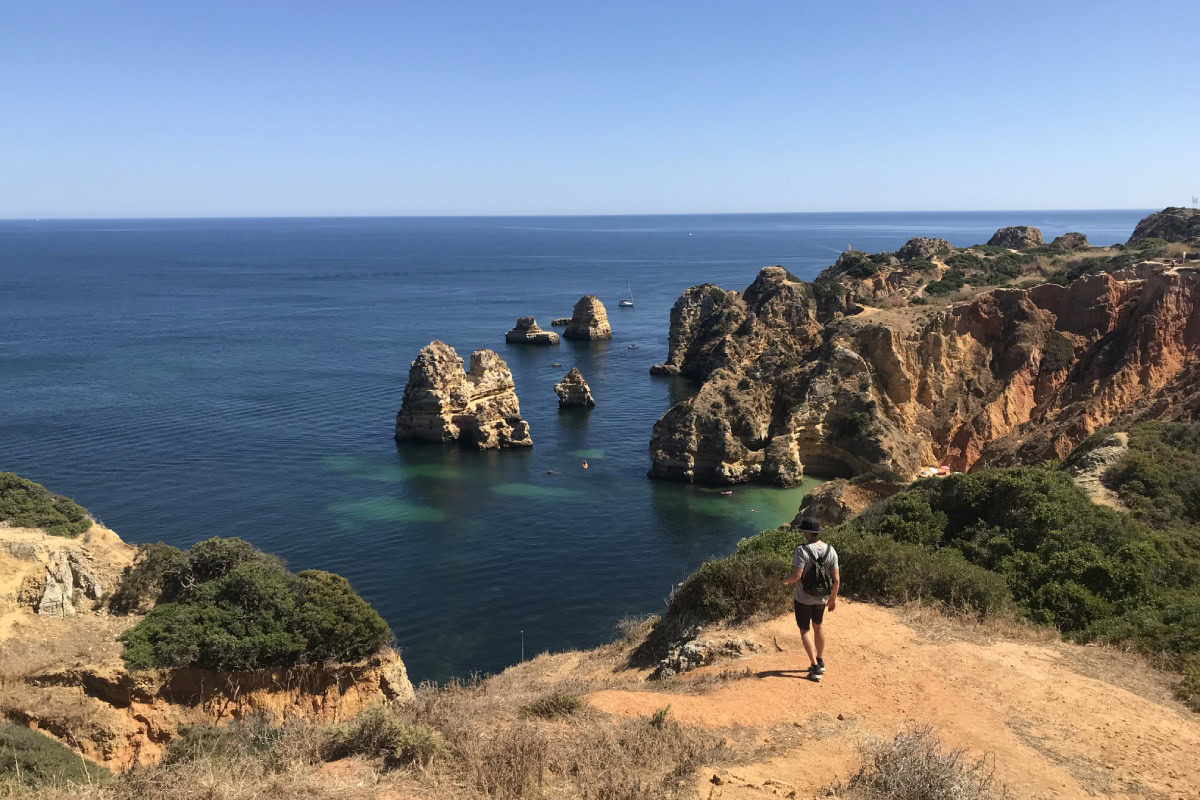
Explore Coastal Trails and Cliffside Hikes
Portugal’s coastline is famous for its dramatic cliffs and stunning viewpoints, especially in the Algarve and around Ericeira. Hike parts of the Rota Vicentina or the trails between Praia da Marinha and Benagil, or take a scenic walk along Ericeira’s cliff paths for epic ocean views.
Visit Sea Caves and Natural Wonders
The Algarve is known for its incredible sea caves, including the famous Benagil Cave, which can be explored by kayak, SUP, or boat. The coastline is dotted with hidden coves, arches, and turquoise waters—perfect for a day of adventure and exploring.
Boat Tours and Dolphin Watching
From Lagos or Portimão, hop on a catamaran or speedboat for a coastal cruise. These tours often include swimming, snorkeling, and dolphin watching, especially in the summer months when marine life is most active. Many include stops at remote beaches or sea caves.
Wine Tasting and Vineyard Tours
Portugal is home to excellent wines, and both the Lisbon region and the Algarve offer easy access to local vineyards and tasting rooms. Sample Vinho Verde, Portuguese reds, and crisp local whites on a guided tour—or visit a small winery for a laid-back tasting with ocean views.
Old Town Wandering
In both Ericeira and Lagos, the old town areas are full of narrow cobbled streets, whitewashed buildings, and colorful tiles. Spend a morning wandering, grabbing a coffee at a local pastelaria, and popping into boutique shops, art galleries, and wine bars.
Cliff Jumping and Caving
The cliffs around Lagos are famous for natural swimming holes and hidden caves. For the adventurous, cliff jumping, coasteering, and caving tours offer a fun way to explore the coastline in a more adrenaline-fueled way.
Horseback Riding
Explore the countryside, beaches, and hillsides of the Algarve or Ericeira area on horseback. Guided rides offer a scenic and peaceful way to experience Portugal’s natural beauty, which is especially magical at sunset.
Yoga, Wellness, and Spa Days
Both Ericeira and the Algarve have a growing number of wellness retreats, yoga studios, and spas. Book a beachfront class or a massage with an ocean view, or join a multi-day wellness retreat to reset and recharge.
Seafood and Sunset Dinners
Portugal’s coastal towns are known for their incredible seafood, from grilled sardines to octopus salad. Wrap up your day with a sunset dinner by the sea in a cliffside restaurant or beach bar in Ericeira or along the Algarve’s southern coast.
Scenic Drives and Day Trips
Rent a car and explore beyond the town centers. Drive the coastal roads between Lagos, Sagres, and Aljezur, or venture inland to explore whitewashed villages, vineyards, and historic castles. The freedom of the road opens up a whole new side of Portugal.
Frequently Asked Questions
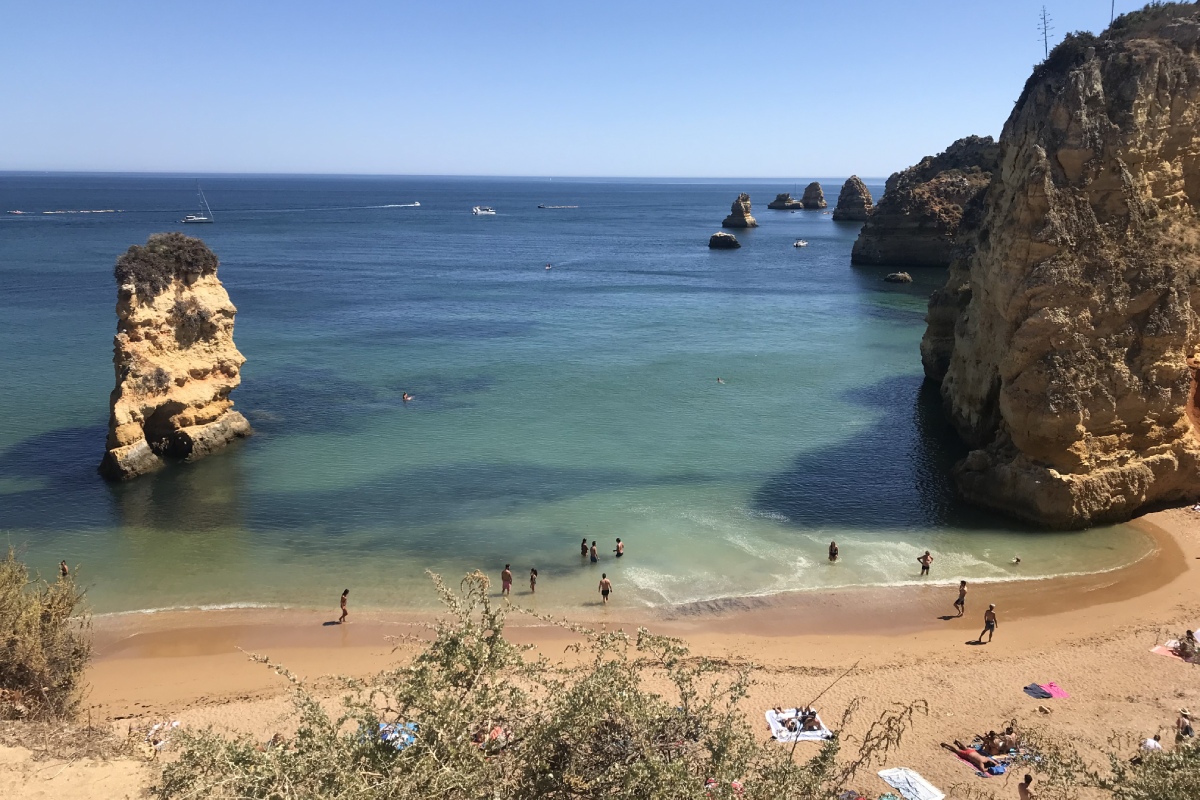
Is Portugal safe?
Definitely! Western Europe is generally safe, and Portugal is one of the continent’s most welcoming and friendly countries. It is politically stable, and there is a relatively low incidence of violent crime. As with any travel destination, it is important to keep valuables locked up and to be aware of your surroundings when moving through heavily populated areas at night. Otherwise, there isn’t much to worry about!
Is Portugal a family-friendly destination?
Yes! With a wide variety of activities and attractions, great food, and a vibrant culture, Portugal has something to offer everyone in the family.
What’s the best time of year to surf in Portugal?
Portugal has waves all year, so the best time of year for surf depends on your surf level and what you’re looking for. For beginners and early intermediates, the summer and autumn are ideal. For advanced intermediates and advanced surfers, the winter brings consistent swells, however, the best season is generally autumn (September through November), when the local weather and conditions are typically favorable and early-season swells are plentiful.
Are there options for beginner surfers in Portugal?
Portugal has a vibrant surf scene and lots of ideal beginner waves, making it a great place for people just learning to surf.
Where should I stay in Portugal for surfing?
Where you stay will depend on what type of surf experience you are looking for. If you want XXL waves, then Nazaré is the call. For pumping beach breaks, try Peniche or Cascais. Ericeira has world-class point breaks and slabs, and is a protected surf reserve. Finally, the Algarve is great for getting away from the crowds and enjoying a bit more solitude and adventure.
Travel Insurance
While we’d rather not think about getting injured while traveling, there are too many cases of people who didn’t think about insurance and get nailed with crazy medical bills after the matter.
You know the deal—better safe than sorry. Battleface or World Nomads Insurance offer very comprehensive travel insurance and cover lots of activities, including surfing and ocean sports. You can easily check them out and get a fast quote below.
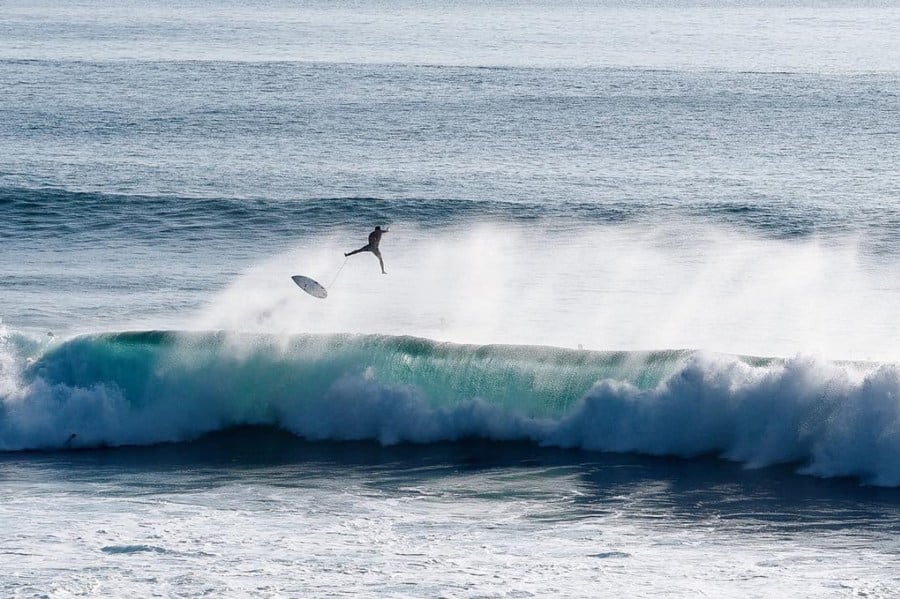

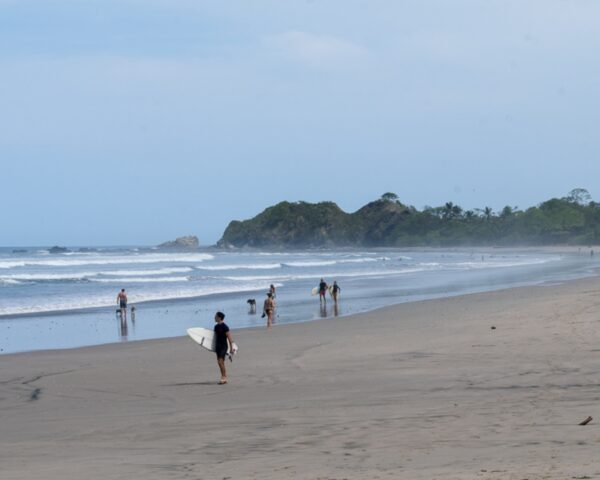


Thank you for a great, detailed article! I am going to Europe in a few months, Portugal was not on my list, it is now!
Awesome! Happy travels!